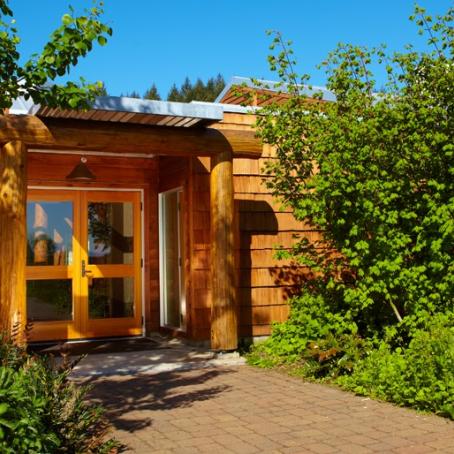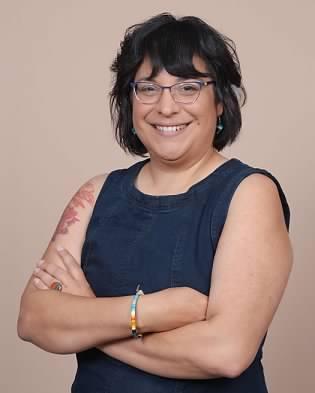The Longhouse at the Lane Community College main campus is a multi-use facility available to all students and provides program and classroom space for culturally appropriate activities.
Examples of such classes and activities could include:
- American Indian Language classes
- Ethnic Studies classes
- Native American Studies
- Credit and noncredit classes on Native American culture
- Activities and events sponsored by the Native American Student Program and the Native American Student Association
- Outside events
In order to ensure that activities that take place in the Longhouse are in keeping with the spirit and purpose of this type of facility, the Longhouse operates under the auspices of the Longhouse Steward as part of the Student Engagement Division.
Reservations
Reservations for fall term will be accepted beginning July 1 of each year.
Please review the reservation guidelines carefully and allow us one business week from the date of your submission to process your application.
History
In 1994, Frank Merrill, a member of the Karuk Nation in Northern California and founder of the Native American Program at LCC, had a dream of having a Longhouse on the college campus. The Longhouse Project was supported largely by students and many local, State, and tribal governments and organizations. On December 3, 2010 Merrill’s dream came true; Lane Community College was the first in the State of Oregon to open the doors of a Longhouse on a community college campus. Situated in Kalapuya territory, the Longhouse is a sovereign space where Native American students and the community can share their values and cultures to create mutual learning relationships.
The building is a symbiosis of traditional and contemporary construction methods with donated timber from the Coquille Forest in Southwest Oregon and blessed by the Coquille Tribe before being turned at a mill in Molalla. The building has intentional axial relations to the cardinal directions in accordance to Native philosophy, with a main entry facing east welcoming new beginnings and one facing west to honor our past. The Longhouse Great Room is a space that represents a place that has familial, sacred, and traditional modes while providing technology necessary for effective teaching and learning. Three entries open to a circular Hall of Honor, a place where we honor the nine federally recognized Native nations of Oregon. The Longhouse also includes a kitchen which allows us to continue to care for each other through sharing meals. The salmon pit allows the continuity of the relationship the Pacific Northwest tribes and Salmon. Adjacent to the southwest corner of the building is the Frank Merrill Veteran’s Memorial Garden, giving reverence to our relations who have and are serving in the armed forces of the United States. The building provides a landmark for the campus and is a gateway introduction for visitors to the campus.
As cultures adapt throughout time, the Longhouse at Lane Community College continues its mission to provide a culturally sustainable home and place of learning. The elegant building is a container of rich and diverse Native American cultures. The Longhouse has had a positive impact on the campus and is a place of hope in the present day.
Meet Rebecca “Agléška” Cohen‑Rencountre (she/they)
Longhouse Steward, Lane Community College
Enrolled Member, Lower Brule Sioux Tribe
Rebecca “Agléška” Cohen‑Rencountre (she/they) serves as the Longhouse Steward at Lane Community College, where she supports Native and Indigenous student success through culturally grounded programming, community engagement, and ceremony. A proud LCC alum and enrolled citizen of the Lower Brule Sioux Tribe, Agléška has been part of the Native community in Eugene, Oregon since 1998, and brings a deep commitment to cultural stewardship, education, and student advocacy.
Raised in Rapid City, South Dakota, Agléška comes from a large, close-knit family within the Oceti Sakowin (Seven Council Fires). She is a Two Spirit Lakota and Jewish parent, a second-year Dakota language learner, and a Ph.D. candidate in American Studies at the University of Minnesota–Twin Cities. Her dissertation explores the history of Rapid City Creek and her family’s legacy as warriors, helpers, and matriarchs from the era of removal through present-day movements for Native self-determination.
At Lane, Agléška works in close collaboration with college leadership, Tribal governments, and local Native communities to ensure the Longhouse remains a living, respectful, and student-centered space. She partners with the Native American Student Program Coordinator, facilitates Longhouse programming rooted in Indigenous protocol and values, and builds relationships that help connect students to culture, support systems, and one another.
She is a member of the Native Nation Rebuilders cohort through the Native Governance Center, where she engages with leaders from across Native Nations to advance sovereignty, education, and sustainable change. Agléška believes that higher education must serve as a place of restoration and relevance for Indigenous students—and that cultural safety is key to academic success.
“Whoever controls the education of our children controls the future of our people.”
— Wilma Mankiller (Cherokee Nation)
“Indigenous people… will do science better if they can have more agency within those fields… They're going to be more open to different kinds of questions…”
— Kim TallBear (Sisseton Wahpeton Oyate)
“Every stroke we take is one less we have to make. Keep going!”
— Rule One, Ten Rules of the Canoe Journey
Agléška welcomes dialogue, collaboration, and community connection. If you have questions, ideas, or would like to work together, please feel free to reach out.
Contact the Longhouse
Longhouse BLD 31
4000 East 30th Avenue
Eugene, OR 97405
Closed Dec 22-26 and again Jan 1-2


